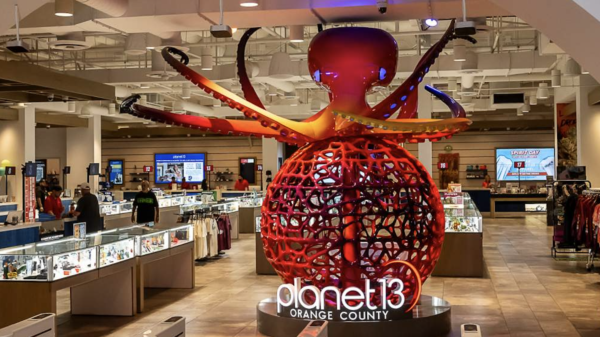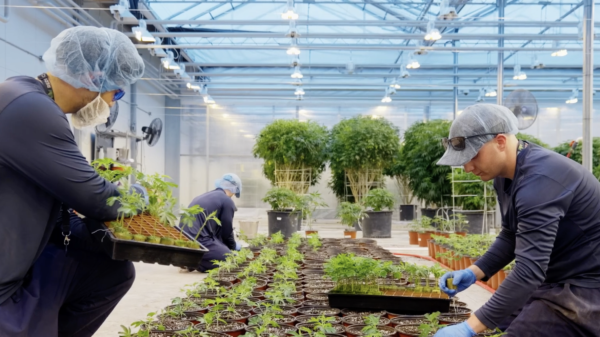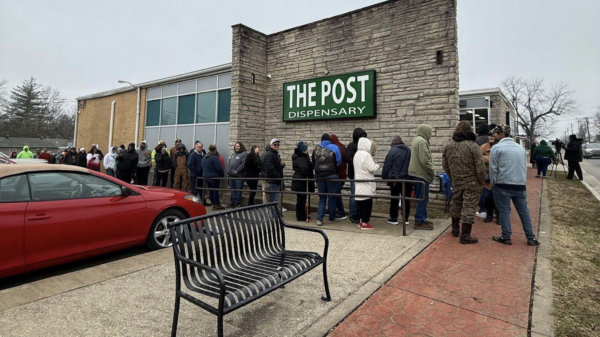On an investor call early Friday morning, CEO Jason Ackerman characterized his company as Canopy’s betting horse in the U.S. market.
It probably struck some listeners as an odd metaphor, but considering TerrAscend’s (CSE: TER) heavy investment south of the border, and significant capital injections from the world’s biggest weed company, the horse comparison holds.
U.S. sales accounted for 93 per cent of revenues in the fiscal quarter ending Dec. 31, 2019, the multinational company said in its earnings report released late Thursday.
While sales — net of excise tax — increased year-over-year by 414 per cent to $25.9 million from $5 million in Q4 2018, they remained flat on a quarterly basis. Sales slowed by 3.5 per cent from $26.8 million in Q3 2019.
Shares in the company rose 7 per cent on the day to $2.90.
TerrAscend said its sales figures reflect its focus on the U.S. market, as Canadian sales slid by 62 per cent to $1.9 million in Q4 2019 compared to the same quarter in the previous year. The company attributed the dip to “ongoing challenges facing the Canadian cannabis markets.”
Net losses attributable to the company rose steeply to $169.5 million, from $17 million in the previous quarter. Accounting for the losses, TerrAscend listed a series of impairment charges: $66.2 million related to the acquisition of The Apothecarium and the closure of Solace RX Inc.; a $7.4 million impairment charge and $4.4 million write-off in Canadian inventory; and $2.3 million related to its Canadian facility.
Gross margin before gain on fair value of biological assets also took a hit, down to negative 16 per cent from positive 18 per cent in the same quarter 2018. The gross margin would have been 39 per cent, TerrAscend said, if not for the Canadian inventory charges.
General and administrative expenses rose to $12.3 million, a 52 per cent increase compared to Q4 2018—again, the additional expenditures being explained by investment in U.S. markets.
Adjusted earnings before interest, taxes, depreciation and amortization (EBITDA) improved slightly quarter-over-quarter to negative $5.7 million, from negative $6.5 million in Q3 2019.
TerrAscend reported having $11.9 million in cash and equivalents. It also said it raised gross proceeds of $120 million at the end of 2019, including a loan agreement with Canopy Growth Corporation (TSX: WEED) for $80.5 million. A portion of that loan was used to pay off a credit facility with JW Asset Management, according to the report.
Read more: Canopy Growth lends TerrAscend $80.5 million
U.S. good, Canada not so good
Recently appointed chief executive Ackerman kicked off Friday’s investor call in Canadian fashion, by painting a future of sunny ways for his company.
“We’ve reported our earnings release this morning,” he said. “We expect our net sales in the first quarter of this year to be approximately $35 million, which represents a 35 per cent sequential growth.”
But the Canadiana stopped there, as he described the drivers of the new growth: Tripling cultivation capacity in Pennsylvania, where they serve the majority of its legal medical dispensary market, and building out a production facility in New Jersey, where it has a network of dispensaries under the Apothecarium brand.
Relatedly, analyst Robert Fagen of Stifel GMP asked TerrAscend for insight on where it has been seeing organic growth in the last quarter.
Ackerman was quick to respond that the growth was not coming from Canada.
“Largely, what I expect to see in Canada is a continued to pressure on making sure that what revenue we take, we do it profitably,” he said. “I think that the downward pressure we saw in the fourth quarter, we’ll see it strengthen back up post, but we’re going to be very disciplined in that marketplace.”
Switching to the margin side and looking at the Q4 gross margin level, Stifel said, which if we back out some of those inventory write-downs and some of that depreciation and amortization, we’re somewhere in the area of 45 per cent gross margin, which is a great improvement from last quarter.
“So, what’s driving that?” Stifel asked.
Pennsylvania — which Ackerman said will continue to be a bigger part of the business while Canada the smaller part — is reporting EBITDA margins of 59 per cent, so plans to triple capacity there should drive considerable profitability. Margins for their California dispensaries range between 45 and 55 per cent, he said.
With Canopy’s heavy investment in TerrAscend, Vivien Azer of Cowen asked for some details on that relationship.
Ackerman said the weed titan is a long-time investor in his company, and the relationship continues to grow in a betting horse-related fashion.
“They see TerrAscend as an important, I would say, horse for them to bet on the future because they have an interest post-federal legalization to be involved more in the United States marketplace,” he said.
Over the course of the call, Ackerman — the previous chief exec at online grocer FreshDirect — kept referring back to a larger retail trend of moving to digital sales.
In California, 100 per cent of their sales are online now, he said.
Analyst Scott Kay of Asymmetry Capital asked how this shift will reshape revenues over time.
Speaking from the perspective of having his career in digital retail, he said businesses are going to shift from online as an afterthought, to an online-first mentality. The current jumble of online platforms makes for a less-than-ideal e-consumer experience.
“So, I would expect over time that we will develop very proprietary software around my knowledge of a digital-first perspective that I think will be a sustained competitive advantage that will really be bespoke to what we do,” he said.
Top photo: Pennsylvania State capitol lit to celebrate the passing of medical cannabis legislation on March 16, 2016 by Gov. Tom Wolf via Wikimedia Commons
nick@mugglehead.com
@nick_laba














